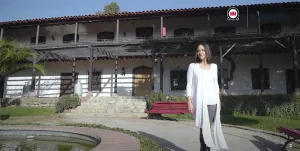The process of innovation in the Master’s Program in Teaching English as a Foreign Language reflects its interest in continuously interrogating its ethos in light of its consistency with institutional guidelines and environmental demands.
The MEI program effectively incorporates the foundational principles of the Institutional Educational Model into its implementation, namely, the Integrated Formative Experience Approach and the Pedagogical Approach. The former is integrated, for example, through the co-constructed provision of solutions for the current development of the profession, while the latter is integrated through active methodologies of participant-centered learning and their experiences, as well as evaluative processes based on performances that promote reflection on teaching and learning processes in English.
The MEI program aligns with the purposes of postgraduate education as it seeks the development of applied knowledge relevant to the professional environments of the participants, based on theoretical reflection on the teaching and learning of English.
The MEI program also responds to socio-political demands regarding the teaching and learning of English in formal instructional environments. Firstly, the program focuses on the foreign language that, by default, public policy has continuously privileged since the late nineties. The implementation of a policy that improves the quality of English learning as a foreign language is inevitably mediated by the generation of learning opportunities by highly qualified teachers. The aforementioned role associated with the teacher has been consistently and empirically emphasized by relevant literature, which translates into highly qualified teachers meeting disciplinary and pedagogical standards. In this regard, the 2021 standards build on almost a decade of experience since the enactment of the guiding standards published in 2014. The current standards focus on the formative role of the teacher; recognize the complexity of teaching; and are recognized as ‘professional values.’
Internationalization: International internship “English Teaching in a Global Context” The Missouri State University internship, in collaboration with the Master in Teaching English as a Foreign Language at Andrés Bello University, strengthens the skills of English teachers. Available for MEI students and graduates and English teachers from Chile or Latin America. More information here



Academic competencies:
Professional skills (current and relevant).
Research or outstanding achievement obtained.
GRADUATE PROFILE
The graduate of the Master’s Program in Teaching English as a Foreign Language at Universidad Andrés Bello possesses theoretical and empirical knowledge of the epistemological foundations of English teaching and learning processes. They develop innovative pedagogical proposals situated in various educational environments, in the areas of teaching and learning methodologies; planning, design, and evaluation, based on factors influencing English learning and teaching, their critical reflection, and inquiry into pedagogical practices.
Upon completion of the program, the graduate will achieve the following Learning Outcomes:
· LO1: To argue, based on critical reflection and inquiry into pedagogical practices in the disciplinary area, about the role of various factors influencing English learning and teaching.
· LO2: To ground pedagogical proposals that consider the theoretical, empirical, and epistemological knowledge of English teaching and learning processes, aimed at their improvement in various educational environments.
· LO3: To design pedagogical proposals, innovative and situated, in the areas of methodologies or planning, design, and evaluation of English teaching and learning processes, based on epistemological knowledge, critical reflection, and inquiry into the pedagogical context.
The training provided enables graduates to professionally perform in educational environments such as the school system, binational institutes, and higher education in the field of English teaching.
GENERAL OBJECTIVE
SPECIFIC OBJECTIVES
· To provide tools that enable the consolidation of knowledge, skills, and abilities in participants so that they can carry out situated inquiry associated with English teaching-learning phenomena in formal instructional contexts.
· To create learning opportunities related to contextualized and informed use, both from second language learning theories and empirical research, of various methodologies for teaching English to develop various linguistic-communicative skills, using technological tools.
· To provide theoretical-practical elements related to English learning planning processes, evaluation of and for English learning as a foreign language, and subsequent evaluative instruments.
· To facilitate spaces that allow for the deepening of conceptualizations associated with contextualized pedagogical management in the classroom through co-constructed critical reflection considering the diverse learning needs of students in a conducive learning environment.
The Master’s in Teaching English as a Foreign Language considers the following development lines:
The Master’s in Teaching English as a Foreign Language is taught on a trimester basis and has a duration of 5 trimesters. The curriculum consists of 13 mandatory courses, including the Final Degree Project II.
| 1st Trimester | 2nd Trimester | 3rd Trimester | 4th Trimester | 5th Trimester |
| Second Language Acquisition: Theories and Approaches | Planning, Design, and Syllabus Development | Assessment for English Language Learning | Management and Planning in the Classroom Incorporating an Inclusive Approach | Final Degree Project II |
| Methodology, Creativity, and Resource Design I | Methodology, Creativity, and Resource Design II | Use of ICTs for Teaching English Language Learning | Research Development in the Teaching Context | |
| Academic Writing in English | Seminar: Current Trends | Situated Inquiry in the Classroom: Initial Exploration | Final Degree Project I |
The teaching-learning methodology of the Program includes strategies to promote student-centered teaching, facilitating the acquisition of learning. Some of the strategies addressed by the program include:
ACADEMIC EXCELLENCE SCHOLARSHIP FOR FIRST-YEAR STUDENTS
SCHOLARSHIP FOR ONLINE CERTIFICATION WITH THE UNIVERSITY OF MIAMI FOR FIRST-YEAR STUDENTS
*These scholarships are available for students enrolling in the October 2024 intake.
SCHOLARSHIP FOR AN INTERNSHIP WITH MISSOURI STATE UNIVERSITY
*These scholarships are available for students enrolling in the October 2024 intake.
Candidates for the Master’s Program in Teaching English as a Foreign Language must hold a degree as an English teacher, a state-certified English teacher, a Bachelor’s degree in English, a Bachelor’s degree in English Language and Literature or related degrees, English translators, teachers of secondary, primary, or early childhood education, or meet the language proficiency requirements. (*)
(*) Refers to one of the highest levels of proficiency in a foreign language, according to the Common European Framework, expressed in a combination of letters and numbers from the lowest (A) to the highest (C). In this case, a level of C1 is expected, a level that at least English teacher applicants should have demonstrated at the time of graduation.
Applicants must complete the application form and attach the following documents:
(*) It is not a requirement for admitting applicants to postgraduate programs, since the titles and degrees that, according to the law, must be requested to admit their entry into Master’s and Doctoral programs are assumed. The above, pursuant to Letter No. 1028 of the Higher Education Superintendence.
In the case of foreign students, applicants from countries that are parties to the Hague Apostille Convention shall submit their documents in accordance with the procedure established for such cases. Applicants from countries that are not parties to said Convention must submit their documents authenticated by the Chilean Consul in the country of origin and the Ministry of Foreign Affairs of Chile.
The complete documentation must be submitted at the time of application for admission.
The selection process for applicants will be based on the fulfillment of the criteria defined above, considering the following weighting for academic and professional credentials: